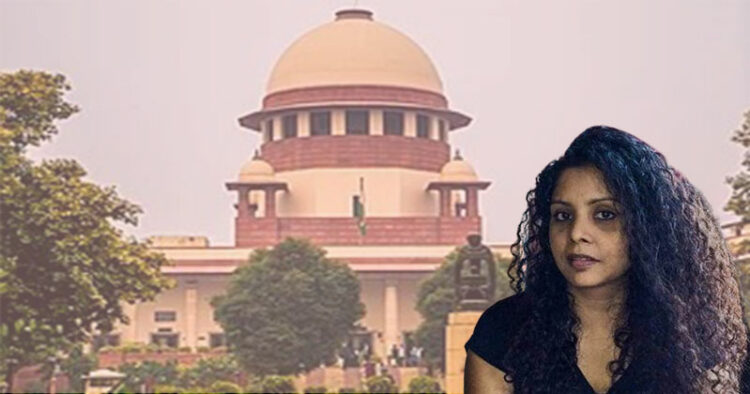Journalist Rana Ayyub’s plea challenging the summons issued to her by a Ghaziabad court in the Prevention of Money Laundering Act (PMLA) case has been rejected by the Supreme Court (Rana Ayyub versus Directorate of Enforcement) on February 7.
The special court had issued summons against Rana Ayyub in a money laundering case lodged against her by the Enforcement Directorate (ED). The bench was presided over by Justices V Ramasubramanian and JB Pardiwala.
Earlier on January 31, the Supreme Court had reserved its judgment on her petition challenging the summons.
Senior Advocate Vrinda Grover appeared for Ayyub, and Solicitor General Tushar Mehta appeared for the ED.
The petitioner sought quashing of the proceedings initiated by the ED and argued that the Ghaziabad court has no jurisdiction to entertain the matter that was alleged to be taken place in Mumbai.
The ED had contended that the money laundering complaint must be filed where the offence occurred. Also, since people from Uttar Pradesh and Noida contributed to Ayyub’s drive, it should be considered that a part of the offence has happened in that jurisdiction.
On November 29, 2022, the special PMLA court in Ghaziabad took cognisance of the charge sheet filed by the ED and summoned Ayyub.
The prosecution complaint was filed under Section 45, read with Section 44 of the Prevention of Money Laundering Act (PMLA), 2002. The Special Court judge had said there was sufficient evidence of a prima facie case for taking cognisance against Ms Ayyub pertaining to the commission of the offence.
The previous year on October 12, the ED had filed a charge sheet against Rana Ayyub, arraigning her for cheating the public during the pandemic and using Rs 2.69 crore she received in charity for generating personal assets, and also breaching the foreign contribution law.
The ED had started a money laundering investigation based on a First Information Report (FIR) registered in September 2021 under provisions of the Indian Penal Code, the Information Technology Amendment Act and the Black Money Act. “Rana Ayyub launched three fundraiser charity campaigns on the ‘Ketto’ platform, starting from April 2020 and collected funds totalling Rs 2,69,44,680,” the ED mentioned in a statement. It also claimed that Ayyub received foreign contributions without registration under Foreign Contribution Regulation Act (FCRA), 1976. The investigation further revealed that only Rs 29 lakh was utilised for relief work.
Afterwards, the agency attached a bank balance of Rs 1.7 crore on February 4, 2022.
The bench headed by Justice V Ramasubramanian opined that under Section 3 of the PMLA, the location where any of the six activities are conducted is the location where the offence of money laundering occurs.
As per the Supreme Court, the question concerned with the fact of the matter is required to be answered on evidence, and thus it leaves it open to raising this issue before the trial court. “We are dismissing this petition,” the bench said.




















Comments